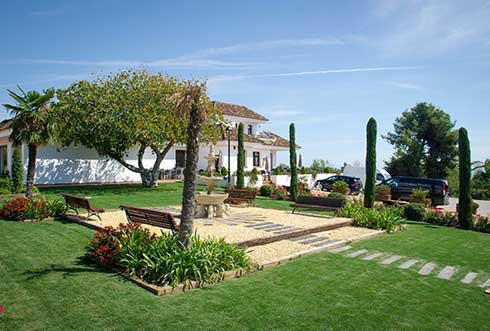
Marbella International University Centre (MIUC)
At MIUC we make sure all of our student’s needs are taken care of when it comes to the development of their professional skills as well as their personal values. For this reason, each student is assigned a Personal Tutor upon enrolment who will always be available for private tutorials to reflect on the student’s overall progress, make plans to further develop and strengthen weaker areas as well as to address any kind of issue that may affect the student’s academic development. Additionally, we offer Academic Support Classes that are designed to fine-tune the necessary skills for academic success such as Research Methods, How to Write an A+ Text and Public Speaking among others. MIUC Faculty goes the extra mile to provide our students a unique combination of academic theory and proven practice ensuring our graduates are equipped with skills that will last a lifetime. This mixed methodology approach makes studying fun while our students are in the best possible educational hands, ensuring a safe, viable and prosperous future through world-class education at MIUC.
Bachelors International Relations
We offer our students a wide and in-depth knowledge of the international system, providing them with the intellectual and creative skills necessary to understand the interactions between states, inter-governmental organisations, and non-state actors.
This BA in International Relations prepares students for a career in world politics, presenting them with specialised knowledge on the processes of global governance, its key actors, and their roles. You will develop the theoretical and analytical skills required to understand and critically reflect on key contemporary issues such as war and peace, human rights and foreign interventionism, globalisation and economic development, terrorism and nuclear proliferation, and ecological sustainability and activism.
• Global governance and strategy: Gain insight into the relationships between countries, the roles of states, intergovernmental organisations, non-governmental organisations and multinational corporations, while learning how to develop successful international strategies to achieve and exercise positions of governance and influence.
• Foreign policy and policy-making: Learn how to effectively formulate, implement and monitor foreign policies and other public policies at an international level, to ensure the accomplishment of the expected goals and successful execution of global strategies for local, regional, national or international organisations.
• Intercultural management: Develop a clear understanding of how gender, ethnicity, religion, and culture impact social relations, and how to manage this cultural diversity to achieve mutual understanding amongst people in culturally complex situations.
• Diplomacy: Learn how to build, maintain and promote diplomatic relations, representing a country’s international interests in political and economic issues while keeping in mind the importance of international branding and the reputation of individuals, governments, and organisations.
• Government relations, lobbying and international leadership: Understand the global processes of institutional and social influence through which people and institutions lead current international politics and economy.
• Business and environment in international relations: Study the dimensions of business and environment in world politics, solving problems, devising strategies and improvements for a wide range of international organizations. Learn how to conduct research, analyse data, prepare reports and present findings in-company or as an external consultant.
• Security and crisis response: Deal with international security and defence by designing and implementing different measures for governments or multilaterals to take to cope with political and military conflicts, environmental disasters and social hazards.
• Political risk analysis and global assessment: Discover the processes involved in analysing specific situations such as government instability, nationalisation, expropriation, crime levels, land rights or intellectual property rights that define the risks for those making investment decisions abroad.
• Communication and negotiation: Develop communication skills and learn about the negotiation processes needed to reach mutually-beneficial outcomes, resolving points of difference and gaining advantages in businesses, non-profit organizations, government branches and legal proceedings.
• Foreign languages proficiency: Elective courses are offered to help you achieve a good command of languages, which is critical to a career in international relations.
• ICT skills: Learn how digital technology is emerging as the main catalyst for social, economic and political change, affecting international politics and relations.
• International and multilateral project management: Learn how to plan, organize and control resources and processes to achieve specific goals in international projects.
• Copy of Passport or ID
• Passport sized digital photograph
• Statement of Purpose (500 words on why you want to study at MIUC, your expectations and aspirations)
• Proof of English Proficiency (If you are not from an English speaking country or have not previously studied in English) IELTS – 6 / TOEFL iBT – 72 / Cambridge Certificate – B2 / MIUC English Test – Pass
• High School Certificate (Officially translated to English or Spanish)
• High School Grade Transcripts (Officially translated to English or Spanish)
Requirements to get a Spanish student visa?
Before you schedule an appointment at the Spanish Embassy in your country there are a few documents you need to have ready. These visa preparation documents highly vary per nationality and sometimes even per state department of your country. See here a list of requirements that usually need to be presented.
• National visa application form
• Biometric pictures
• Passport with expiry date at least 6 months past the date you are applying for
• Health Insurance Letter from Spanish provider
• Medical Examination, following the current requirements of the Spanish Health Association
• Accommodation Letter
• Bank statement, showing that you can financially sustain yourself during your whole stay in Spain (this amount varies every year, contact us for the up-to-date requirements)
• Invitation and offer letter from a Spanish academic institution
• Visa fees paid
• Most of these documents need to be translated into Spanish by a sworn translator and legalized by the notary or Spanish authorities, depending on your country of origin.
LEAP has a visa success rate of 95%. Contact one of you educational experts to enlarge your acceptance chance



